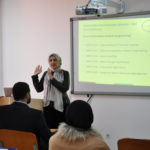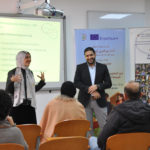DeVilag prevent Egyptian farmers from migrating
On Thursday, February thirteenth, staff members from Egypt’s top universities for sustainable development – the American University in Cairo (AUC) and Heliopolis University for Sustainable Development – met on HU’s campus to discuss AUC’s Graduate Programs in Sustainable Development with an audience of prospective students.
AUC and HU are both partners in a European Union (EU) funded project under the ERASMUS+ project, entitled Steering Migration “DeVilag,” which seeks to provide more sustainable agricultural strategies to Egyptian farmers through better agricultural training of university graduates and more accessible knowledge hubs for farmers. This, in turn, will prevent Egyptian farmers from migrating, oftentimes under unfavourable and unsafe circumstances, to other parts of the world, and will help establish a more viable, profitable, and healthy agricultural market in Egypt.
In addition to AUC and HU, other partners of the DeVilag project are Fayoum University, the Library of Alexandria (Bib-Alex), Egypt’s Agricultural Research Center, as well as the international RWTH Aachen (the project coordinator), the Swedish University of Agricultural Sciences, and the University of Nicosia.
One of the specific objectives of DeVilag is to “modify and reorient the existing post- and undergraduate curricula to supply the market with graduates who contribute to the implementation of the country’s sustainable development vision and ensure the sustainable rural development.” This meeting served as a stepping stone towards achieving DeVilag’s second Work Package.
AUC is planning to introduce new courses into their Master’s in Sustainable Development program in Fall 2020 to focus specifically on sustainable agriculture and migration patterns. The new courses are as follows: Integrated Water Resources Management, Water-Energy-Food Nexus, Sustainable Agriculture, and International Migration and Development.
AUC’s Master’s in Sustainable Development program already has an interdisciplinary nature; graduates can choose between four-degree tracks (Green Technologies, Entrepreneurship, Sustainable Cities, and Sustainable Communities) offered through four of the University’s schools with the requirement that no matter which degree track is chosen, graduates must take courses from the other disciplines, but by adding an agricultural dimension that is specific to an Egyptian context, it will be ensured that graduates of the program will enter the field with an adeptness for land management practices not yet seen or taught in much of the MENA region.
Representatives from the Center for Applied Research of the Environment and Sustainability (CARES), the research centre at AUC that coordinates the Graduate Programs in Sustainable Development, highlighted these program strengths to a room filled with interested people of all ages, and even numerous nationalities. Also heavily emphasized were the fellowships offered through AUC and some third-party donors, such as the Al-Alfi Foundation, making the two-year program much more attainable to a wider student base.
If all goes as planned, improving and expanding upon AUC’s well-established degrees in sustainable development will become a model for other Egyptian universities, whether private or public and enable them to establish their own acclaimed degree programs in sustainable development that are catered both to the skills and needs of their degree-earners and their local agricultural communities. As for the near future, though, hopefully at least a few of these information session-attendees at HU will become some of the first graduates to help make these positive agricultural changes transpire. In time, this should forward Egyptians to once be awarded the status as some of the world’s most important, skilled, and sustainable cultivators.


